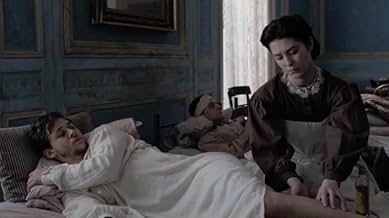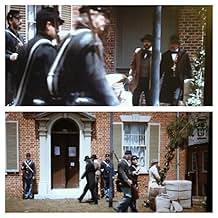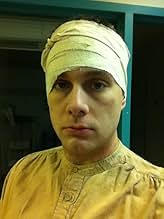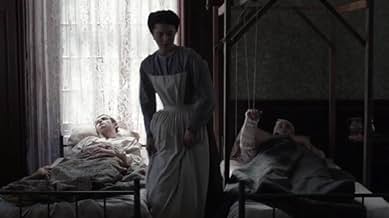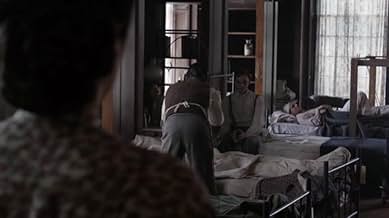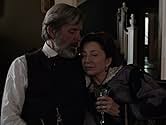IMDb-BEWERTUNG
7,5/10
3075
IHRE BEWERTUNG
Das Leben zweier freiwilliger Krankenschwestern, die im Bürgerkrieg auf unterschiedlichen Seiten standen - die Abolitionistin Mary Phinney aus Neuengland und die Anhängerin der Konföderierte... Alles lesenDas Leben zweier freiwilliger Krankenschwestern, die im Bürgerkrieg auf unterschiedlichen Seiten standen - die Abolitionistin Mary Phinney aus Neuengland und die Anhängerin der Konföderierten Emma Green.Das Leben zweier freiwilliger Krankenschwestern, die im Bürgerkrieg auf unterschiedlichen Seiten standen - die Abolitionistin Mary Phinney aus Neuengland und die Anhängerin der Konföderierten Emma Green.
- Auszeichnungen
- 1 wins total
Folgen durchsuchen
Empfohlene Bewertungen
I'm not sure why any viewer would compare a series set during American revolutionary times (the Civil War) to Downton Abbey. Downton Abbey was simply a remake of the popular (and recently remade) series, Upstairs, Downstairs. It was mostly an entertaining soap about a rich family and their household, but I digress...
First off, all of the actors are well-cast and do suitably good work. It's only been two episodes, so we'll have to wait and see as far as whether any heavy lifting will be required, acting wise. It's safe to say that we should expect to see the transformation of some of the characters, insofar as their beliefs are portrayed. There is a doctor, for example, who has no problem with slavery, but believes that it is his duty to equally treat Union and Confederate soldiers because, "Blood does not run grey or blue, it runs red." The nurse to whom he makes this argument (Nurse Mary/Baroness), is a staunch supporter of the Union and believes that as a Union hospital, Union soldiers can claim priority.
We have familiar faces in this cast - L. Scott Caldwell, Donna Murphy, Gary Cole, Tara Summers, and new ones in Shalita Grant, McKinley Belcher III, and Mary Elizabeth Winstead. While Mercy Street bears some similarity to The Knick due to its setting (a hospital) and a promise of change to come, it is less graphic in its portrayal of the everyday occurrences of the medical world.
With the popularity of Hamilton on today's Broadway stage, Mercy Street is a welcome addition to the TV lineup, as anything that encourages today's American to learn about the past is a boon, indeed.
First off, all of the actors are well-cast and do suitably good work. It's only been two episodes, so we'll have to wait and see as far as whether any heavy lifting will be required, acting wise. It's safe to say that we should expect to see the transformation of some of the characters, insofar as their beliefs are portrayed. There is a doctor, for example, who has no problem with slavery, but believes that it is his duty to equally treat Union and Confederate soldiers because, "Blood does not run grey or blue, it runs red." The nurse to whom he makes this argument (Nurse Mary/Baroness), is a staunch supporter of the Union and believes that as a Union hospital, Union soldiers can claim priority.
We have familiar faces in this cast - L. Scott Caldwell, Donna Murphy, Gary Cole, Tara Summers, and new ones in Shalita Grant, McKinley Belcher III, and Mary Elizabeth Winstead. While Mercy Street bears some similarity to The Knick due to its setting (a hospital) and a promise of change to come, it is less graphic in its portrayal of the everyday occurrences of the medical world.
With the popularity of Hamilton on today's Broadway stage, Mercy Street is a welcome addition to the TV lineup, as anything that encourages today's American to learn about the past is a boon, indeed.
I love all historical and period pieces so watch this one after my Downton Abbey fix. However, I am continually distracted during these episodes by the non authentic accents of characters who are supposed to be Virginians but sound more like they have dropped in from Georgia or Alabama. All southern accents are not created equal. Actors use coaches to learn proper English, Irish, German, Italian, etc. accents. Someone needed to teach these actors to speak Virginian. It is jarring to hear accents that are out of place with the setting.
I could also do without all the graphic blood and gore but that seems to be part and parcel of all films these days.
The series does hold one's attention. I must have not been paying strict attention because I do not remember the action ever dealing with the Union officer smuggled by Frank. When do they discover him?
I could also do without all the graphic blood and gore but that seems to be part and parcel of all films these days.
The series does hold one's attention. I must have not been paying strict attention because I do not remember the action ever dealing with the Union officer smuggled by Frank. When do they discover him?
This series is unique for presenting the ambivalence and contradictions of the Civil War Era. The protagonist nurse is a staunch abolitionist who is made to accept the need to also help Confederate wounded by a doctor who is loyal to the Union and thus a traitor to his slave- owning pro-Confederate Maryland family. Nevertheless he is unmoved by abolitionist sentiments--until he meets a free black Philadelphia man he admires.
The head of the Southern family that owns the hotel-turned hospital works to save his holdings and business interests while not betraying his Southern loyalties. He opposes efforts by Union soldiers to enforce claims to return runaway slaves (seems unhistorical here set in 1862- -I thought the Union stopped returning "contraband" in 1861.)
The African-American characters debate the merits of freedom versus the security of slavery or of employment not much removed from slavery.
In short, the moral certainties of hindsight are removed and the characters must struggle in their contemporary context. I do enjoy that.
Some casting choices were surprising but they all work.
The head of the Southern family that owns the hotel-turned hospital works to save his holdings and business interests while not betraying his Southern loyalties. He opposes efforts by Union soldiers to enforce claims to return runaway slaves (seems unhistorical here set in 1862- -I thought the Union stopped returning "contraband" in 1861.)
The African-American characters debate the merits of freedom versus the security of slavery or of employment not much removed from slavery.
In short, the moral certainties of hindsight are removed and the characters must struggle in their contemporary context. I do enjoy that.
Some casting choices were surprising but they all work.
(I hope what I have written is not considered spoilers - I would not do that intentionally!)
I understand a lot of the criticisms written in these reviews. My reaction to watching Episode 1 was "What is this? Desperate Housewives of Civil War Medicine??" - because it seemed so "overheated" and unbelievable. For example, when Nurse Phinney has to sleep on the floor of the ward among the soldiers' beds, I exclaimed, "That didn't happen! That would never have happened! But then I started to read the true story of Nurse Phinney, "Adventures of an Army Nurse in Two Wars" and guess what - it DID happen plus a whole lot more!
What I saw as "overheated" in terms of the drama between hospital personnel was actually DOWNPLAYED from the true reality!!! The surgeons and doctors did NOT want female nurses around and wanted to drive them OUT. The hospital WAS as chaotic, as shown. And as far as soldiers not being fed - YUP, it was only TOO TRUE!!! There was a shocking amount of graft and profiteering going on in the food supply chain! I highly recommend the true story of Nurse Phinney - it is quite a read!!
I understand a lot of the criticisms written in these reviews. My reaction to watching Episode 1 was "What is this? Desperate Housewives of Civil War Medicine??" - because it seemed so "overheated" and unbelievable. For example, when Nurse Phinney has to sleep on the floor of the ward among the soldiers' beds, I exclaimed, "That didn't happen! That would never have happened! But then I started to read the true story of Nurse Phinney, "Adventures of an Army Nurse in Two Wars" and guess what - it DID happen plus a whole lot more!
What I saw as "overheated" in terms of the drama between hospital personnel was actually DOWNPLAYED from the true reality!!! The surgeons and doctors did NOT want female nurses around and wanted to drive them OUT. The hospital WAS as chaotic, as shown. And as far as soldiers not being fed - YUP, it was only TOO TRUE!!! There was a shocking amount of graft and profiteering going on in the food supply chain! I highly recommend the true story of Nurse Phinney - it is quite a read!!
I am greatly enjoying this series. The production has the feel of the period from the mud in the streets, to the period decor of the rooms and costumes, all the way to the amputated limbs being taken away in a wheelbarrow. War is hell, and none was more so than the Civil War, when weaponry had become so efficient as to mow down regiments marching forward in outdated styles of battle. Some viewers might object to bloody surgery scenes. However, one of the most affecting scenes to me was of a Confederate soldier with shell shock who told of the horror of battle, "the smoke and blood and the screaming, you never know where it's coming from."
Soldiers who make it to this hospital are cared for to the best of their abilities by Mary Phinney and Dr. Jedediah Foster, played admirably by Mary Elizabeth Winstead and Josh Radnor. Their own personal dramas are interwoven into the story lines quite well. Applause to the producers and directors!
Soldiers who make it to this hospital are cared for to the best of their abilities by Mary Phinney and Dr. Jedediah Foster, played admirably by Mary Elizabeth Winstead and Josh Radnor. Their own personal dramas are interwoven into the story lines quite well. Applause to the producers and directors!
Wusstest du schon
- WissenswertesThe real Alice Green actually died a few weeks short of her 15th birthday in early 1860, over a year before the start of the Civil War.
Top-Auswahl
Melde dich zum Bewerten an und greife auf die Watchlist für personalisierte Empfehlungen zu.
- How many seasons does Mercy Street have?Powered by Alexa
Details
- Erscheinungsdatum
- Herkunftsland
- Offizielle Standorte
- Sprache
- Auch bekannt als
- Улица милосердия
- Drehorte
- Laburnum House - 1300 Westwood Avenue, Richmond, Virginia, USA(Mansion House Hotel)
- Produktionsfirmen
- Weitere beteiligte Unternehmen bei IMDbPro anzeigen
Zu dieser Seite beitragen
Bearbeitung vorschlagen oder fehlenden Inhalt hinzufügen




